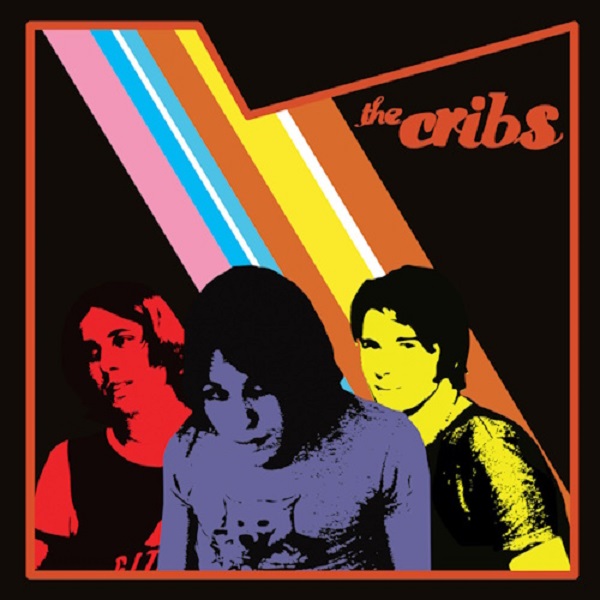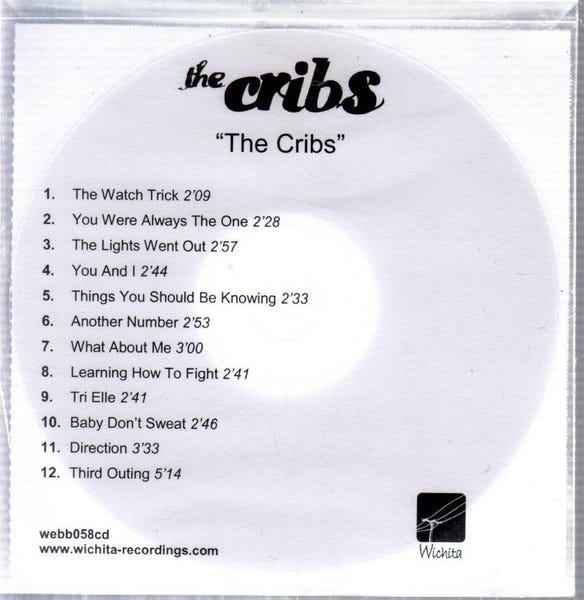The Cribs (2004), The Cribs

In 2004, George W. Bush was re-elected President of the United States. BBC’s “Top of the Pops” stopped advertising Coca-Cola in an effort to be more health-conscious. “Half-Life 2,” one of the greatest computer games ever made, was released and revolutionized the first-person-shooter genre. The Strokes had already released two excellent records of raw New York garage pop-rock that would invigorate an entire generation of musicians, leaving countless copy-paste-bands in their wake. In short, 2004 was a great year for teenage-me, who didn’t give even-one-damn about politics and was addicted to nasty soda pop, computer games I would continue to discuss well into my thirties, rock music on repeat, and, most importantly, trying to appear as cool as possible to my peers by pretending to be something I wasn’t. Ah, the fog of youth.
Enter the Jarmans. Twins Gary and Ryan, along with their younger brother Ross, saw The Strokes’ youthfully-disheveled frontman, Julian Casablancas, perform “Last Nite” in feigned apathy, as if he wasn’t aware of trying to be the coolest guy in the room on November 6th, 2001, at Top of the Pops. The Jarman brothers immediately had to form their own copy-paste garage rock band, and The Cribs were born. We’ve seen this before; The Strokes were very much a re-run of the Sex Pistols performing at CBGB in the ’70s; nine-out-of-ten people in the audience went on to create their own band, but this time the audience was different: greasy-long-hairs addicted to Daria and Michael Moore documentaries, undesirables that McDonald’s wouldn’t even touch with a ten-foot pole.
“Before the Cribs I used to try and get jobs in McDonald’s but even they wouldn’t employ me, which was so weird. I still don’t know why they wouldn’t give me a job. I really wanted to do it. I would neaten myself up and tell them I could work whatever hours they wanted. I went for job interviews in McDonald’s three times but they never gave me a job. They never said why either.” — Ryan Jarman, The Cribs. The Guardian, Feb. 2013
There were countless “British Strokes” bands, but The Cribs were special. Their debut self-titled album was recorded in 7 days in an 8-track studio, with one song being produced by the famous Chicago-eccentric Bobby Conn (which I’m sure I will write about one day; his albums “The Golden Age” and “King for a Day” are masterpieces in their own right). Yet somehow, the young brothers struck gold despite flunking out of music school and failing to be McDonald’s material.
Ryan and Gary’s obviously British yet truly authentic dueling vocal warbling, Ryan’s amateur yet innovative guitar playing that sounds more like furiously attacking someone after one-too-many shots at the pub, and, most importantly, the brothers’ sharp ear for melody inadvertently created an extremely high bar for them to surpass with every future Cribs release.
The album starts with an odd number, “The Watch Trick,” which sounds like a silly-meme-song at first but quickly becomes something far more complex with its ending mini-chorus about a minute and thirty seconds into the track, shifting into dangerous hyper-melodic-territory; this flows into “You Were Always the One,” a sharp-powerpop number showcasing the Jarmans’ ability to conjure a hook out of nothing more than Gary’s straightforward basslines accompanying Ryan’s organized-chaos-guitar-work, and Ross just on drums (poor little bro never gets the spotlight).
Video: The Cribs – You Were Always the One
Songs like “Another Number” showcase Ryan Jarman’s bizarre yet brilliantly neurotic guitar-playing, which sounds like four-year-old-plays-guitar, but upon further listening, is actually a creatively-intricate melody that is infinitely-memorable and impossible to get out of your head for three-straight-weeks; featuring a nervously-picked guitar line formed by what has to be a malformed chord going into a “dududududududu” for the chorus, then back to the broken melody; a perfect microcosm of Ryan’s unique playing style which is truly idiot-savant-levels of “what the fuck?”
In an effort to remain objective, not everything is rainbows here; some tracks just miss the mark entirely. “Tir’elle,” the Bobby Conn produced track, is an instant skip, along with “Learning to Fight,” which is marred by repetitive, ugly verses.
Overall, The Cribs’ first album is fast-paced hook after hook after hook into utter exhaustion; it’s good sex. The first time I played this album, it was on a lark while I was working, to put something on in the background while fiddling with an Excel sheet; this was a mistake as ten minutes later I was replaying songs constantly and not getting anything done; an immediate sign that what I’m listening to is special, something I will be listening to for years to come.
My wife would often comment, after I emerged from my office exhausted and sweaty, “You’ve listened to the same song twelve times in a row, are you ok?” This is now a common occurrence whenever I start listening to The Cribs.
Upon deciding to write this article, I thought, “I haven’t listened to this album in a while; hopefully, I didn’t wear it out, and it’s as good as I remember.” My worries were misplaced as I ended up a broken record repeating history, looping insanely catchy tracks like “You and I,” “The Lights Went Out,” and “What About Me” while typing away about how much I love this album and occasionally looking back at my work computer to ensure no one sent me a furious email.
It’s easy to come to the conclusion that the Jarman brothers were trying to be The Strokes. The Cribs, like teenage-me, wanted to be something they’re not. That’s the easy take, the lazy take. The more nuanced-take is that The Cribs, while inspired heavily by The Strokes, could never sound like their inspiration because of their unequivocal-essence; instead of being Just-Another-Number, their natural talent and gift for crafting catchy pop music shines through, exploding with youthful vigor into what can only be called one of the best records of 2004.
